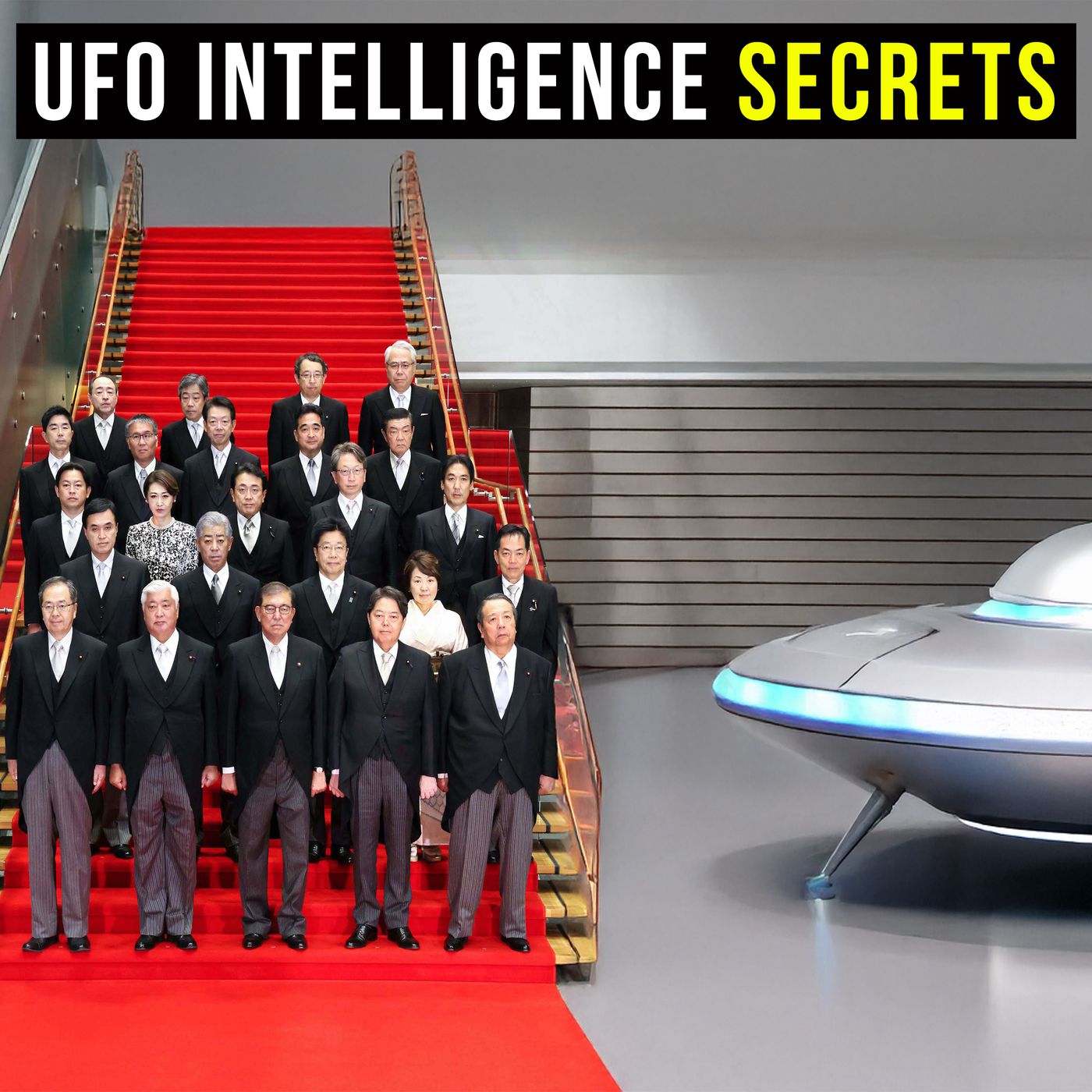Show Notes
Cristina Gomez reports on the designation by AARO of Japan being a UFO hotspot, and Japan's investigation into the possibility of the US withholding UFO information. This action follows a former defense minister's statement regarding the UAP issue. The newly formed committee aims to uncover the truth about UFOS and potential disclosure, and other UFO news updatesTo see the VIDEO of this episode, click or copy link - https://youtu.be/09v2fF10pzo
Visit my website with International UFO News, Articles, Videos, and Podcast direct links -www.ufonews.co
00:00 - US Withholding UFO Data
03:02 - Japan Designated as UAP Hotspot
04:22 - Intelligence Sharing Gap Concerns
08:15 - Nuclear Facilities and UAP Pattern
09:55 - Mandatory Reporting Directive
11:00 - Japan's Transparency
Become a supporter of this podcast: https://www.spreaker.com/podcast/strange-and-unexplained--5235662/support.
Show Transcript
Japan's former defense minister just admitted on national television that the United States may be withholding UFO intelligence from its closest military ally in Asia. Japan has created a parliamentary committee to investigate UAP and the former defense minister is a member. And what they are revealing about military sightings, American secrecy, and objects over nuclear facilities represent the most transparent governmental approach to this subject we have ever seen on earth. That is a pretty big statement. As always, I am here to report the information without bias, and you can decide what to believe. You can find the sources in my detailed articles at UFONews.co along in the description box below. Hey, UFOlogers, I am Cristina Gomez, and welcome to this episode of UFO News Updates.
Here is the former Defense Minister Hamada responding to questions about American intelligence sharing on NewsNation. In this clip, journalist Ross Coulthart asks Hamada about intelligence sharing between the United States and Japan. Coulthart states that it suggests to him that the Americans are seeing things around Japan from their bases and perhaps they are not sharing that information with the Japanese government. He asks if there is any other explanation as to why the Americans would know that Japan is a UFO hotspot. Because if it is not information coming from the Ministry of Defense, if it is not coming from civilians, as Hamada stated, it must be coming from the US military bases in Japan. Coulthart asks if America is not sharing that intelligence with Japan, and if that is the case, is that a concern to Hamada.
In response, Representative Hamada states that the Japanese can think that the Americans have the high awareness and also the ability to detect such objects. But it is up to Americans to decide if such information is necessary for the Japanese and to be shared with the Japanese.
In May of 2025, the UFO Diet members league submitted a formal proposal to Japan's defense minister, demanding the establishment of a dedicated UAP office within the Ministry of Defense. Their requirements included systematic collection and analysis of UAP data, information sharing with the United States, regular reporting to Parliament, and public disclosure of findings. Representative Hamada served as a defense minister in two separate administrations. And according to the Center for Strategic and International Studies, Japan maintains one of the most sophisticated air defense networks in the Asia-Pacific region, monitoring airspace for potential threats from China, Russia, and North Korea. Yet the same government has now formally acknowledged UAPs deserve equal scrutiny as conventional security threats.
When Ross Coulthart asked about American statements that Japan is a UAP hotspot, Hamada provided this response. In this clip from NewsNation, Hamada explains that the Defense Department has designated as hotspot the areas where the US military are very actively deployed. And also, these are the areas where there are very tense situations. So the US military activities in volume and also in the activity range are very high in the sky and also over the ocean. And so the Japanese self-defense forces have officially said that there is no case that should be made in public.
In August of 2023, AARO included Japan in a report to Congress listing global UAP hotspots. According to the Federation of American Scientists, the Pentagon maintains approximately 120 military installations across Japan, the highest concentration of American forces in the Asia-Pacific theater. But Hamada confirmed Japanese Self-Defense Forces have officially stated there are no cases requiring public disclosure. And this creates a contradiction. If Japan is a hotspot, but the Japanese military reports nothing, who is observing these objects?
The contradiction becomes more concerning when examining against established treaties. Japan and the United States have maintained a mutual defense treaty since 1960, obligating military cooperation on security threats. And Hamada's acknowledgement raises direct question about intelligence sharing protocols. If American forces operating from Japanese bases are detecting anomalous objects but not sharing that data with host nation defense forces, it represents either a significant breach of normal intelligence cooperation or suggests these objects fall into a classification category that supersedes standard allied information sharing.
Former representative Asakawa expanded on this during the interview, noting that defense ministry officials have provided carefully worded responses when questioned about existing UAP data. In this clip from the NewsNation interview, Representative Asakawa states that his understanding is that the officials are saying that there might be or would be something that could be publicized or shared with the general public when certain conditions are there.
The officials did not claim no data exists. The statement was that nothing can be shared currently, implying data exists under classification, and here is a question worth considering. If these objects represent foreign adversary technology from China, Russia, or North Korea, why would that intelligence remain classified from public disclosure while simultaneously being withheld from America's primary Asian military partner?
In November of 1986, Japan Airlines Flight 1628 encountered three objects during a cargo flight from Paris to Tokyo. Maybe you know this case. The incident occurred near Alaska and lasted 50 minutes. Captain Kenji Terauchi described the primary object was twice the size of an aircraft carrier. And according to John Callahan, who served as an FAA division chief of the accident and investigation breach, multiple radar facilities tracked these objects. And Callahan had stated publicly that the CIA confiscated all data from this incident. However, he retained copies of the radar evidence, which later entered the public domain.
Former representative Asakawa addressed this case during the interview. In this clip from NewsNation, Asakawa explains that he asked the government when he was a member of the National Diet if they have any information regarding this, and they said simply no disclosure. And as Coulthart pointed out, this case, more details about this case was revealed at the event by the Disclosure Project. And so Asakawa thinks that this case also proves that UFO issues are very important and significant political and military national security problem.
Captain Terauchi faced significant professional consequences for discussing his sighting publicly. And the incident established a pattern that researchers have documented repeatedly. Military and commercial pilots observed anomalous phenomena. Radar systems confirmed the presence of something, and official channels either dismissed the reports or classified the data beyond public access. And in this case, for Terauchi, he was stripped of his wings and was given an office job.
If you enjoy UFO news, updates, case studies, and interviews on you will like this channel, hit that like button, subscribe and share this episode with those you want to keep in the know with the latest UFO news.
On July 26, 2025, three mysterious lights appeared over the Genkai Nuclear Power Plant in Japan, remaining visible for an extended period. And initial explanations suggested drones, then later high-altitude aircraft. Local authorities reached no definitive conclusion, and the incident followed an earthquake in Saga Prefecture just three and a half hours earlier. During the interview, Ross raised the question of whether there might be a correlation between seismic activity, nuclear facilities, and UAP sightings.
Then, during the Fukushima nuclear disaster back in March of 2011, multiple witnesses reported spherical objects hovering near the damaged reactors. Japanese television cameras captured footage. And Hamada confirmed awareness of the Fukushima sightings. In this clip from NewsNation, Representative Hamada discusses the nuclear Fukushima nuclear reactors and UAPs. He states that they say that they have seen UAPs on TV camera and he actually knows someone, a journalist who has been there and filmed the UAPs and also had seen them with his own eyes. He is not sure if they can think about this and the Genkai incident at the same level, but he is aware that AARO has said that there is some kind of, there might be some kind of relationship between nuclear facilities and UAPs.
Then Defense Minister Taro Kono issued a directive establishing mandatory UAP reporting protocols for Japanese self-defense forces. And the order included three requirements. Ensure cases are reported, obtain photographic or video evidence when possible, and analyze all cases. This directive came after years of advocacy from members of what would become the UFO Diet Members League. And the language was unambiguous. Military personnel observing these objects were required to document and report such incidents through official channels.
Yet, when Asakawa questioned defense officials about official reporting, the responses indicated data collection without public disclosure. Asakawa connected this to the Chinese surveillance balloon incident over Tohoku, suggesting defense forces possessed detection capabilities they chose not to reveal publicly to avoid exposing intelligence methods.
Japan has demonstrated that at the highest level of government, this subject is being treated as a legitimate national security and scientific concern. The question now is what information exists in classified channels, why it remains classified, and whether parliamentary pressure in Japan will force disclosure that other nations have resisted. What do you think should happen next? Should the United States be sharing UAP intelligence with allied nations like Japan, or have they already? Let me know in the comments. I am Cristina Gomez and that is it for today. I will see you again tomorrow at 10 AM PST for another UFO News Update. Be safe and remember, keep your eyes on the skies.
If you enjoyed today's show hit that like button and if you are not subscribed what are you waiting for. Hit the notification bell as I do daily UFO news and updates. Fresh UAP stories, government disclosures, and breaking developments land here every single day.
.png)


Comments & Upvotes